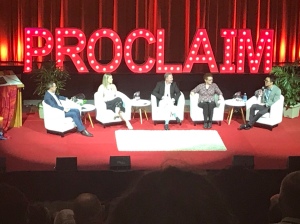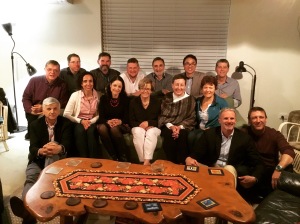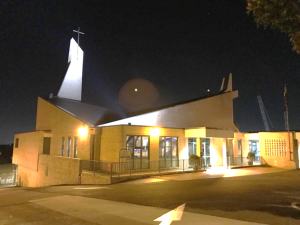 Held in Brisbane for the first time in its short history, Proclaim Conference 2018 gathered more than 600 participants from 12-14 July to discuss parish evangelisation with its theme drawn from John’s Gospel, “Make your home in me”. Keynote speakers over the three days included Archbishop Mark Coleridge, Cardinal John Dew from Wellington, Ron Huntley of the Divine Renovation network, Karolina Gunsser from Citipointe Church in Redcliffe, and Lana Turvey-Collins from the national facilitation team for the Plenary Council.
Held in Brisbane for the first time in its short history, Proclaim Conference 2018 gathered more than 600 participants from 12-14 July to discuss parish evangelisation with its theme drawn from John’s Gospel, “Make your home in me”. Keynote speakers over the three days included Archbishop Mark Coleridge, Cardinal John Dew from Wellington, Ron Huntley of the Divine Renovation network, Karolina Gunsser from Citipointe Church in Redcliffe, and Lana Turvey-Collins from the national facilitation team for the Plenary Council.
With a renewed process for workshops that encouraged shorter inputs and extended dialogue, and discussion panels on each day, the conversations were broad and, for the most part, unguarded. From the urgency of God’s mission, to the inseparability of evangelisation from the person of Jesus, and of the parish from the unchurched, to the health or otherwise toxicity of our parish cultures, and the ongoing experience of the sexual abuse crisis, participants were given nourishment and challenge for their pastoral practice.
I was privileged to facilitate four workshops and participate in a panel on ‘culture change, parish renewal and evangelisation’ together with Sally Hood of ACU Campus Ministry, Ron Huntley, and Andrea Dean of the Office for the Participation of Women. Below is a summary of my brief workshop input which looked at the connection of parish life to the unchurched.
Horizons of Parish Renewal
 As a former ‘outsider’ to the Church it has taken some twenty years to learn to live as a baptised person and still the learning continues. Through my own faith experience I have come to believe that the parish is essential to Christian growth and discipleship. Indeed, if we did not have parishes we would have to invent them – local communities of faith gathered around the Word and Eucharist where faith is given shape and social support, fostered into discipleship and then enters the world through our living witness.
As a former ‘outsider’ to the Church it has taken some twenty years to learn to live as a baptised person and still the learning continues. Through my own faith experience I have come to believe that the parish is essential to Christian growth and discipleship. Indeed, if we did not have parishes we would have to invent them – local communities of faith gathered around the Word and Eucharist where faith is given shape and social support, fostered into discipleship and then enters the world through our living witness.
Together with the family and school, the parish is where the majority of people encounter the Church and it is where the vast majority of clergy will live out their life’s vocation. So the health and vitality of the parish matters to all of us, not only in respect of our common life but also for our personal faith.
However, part of the challenge is that when our parishes have not grown in roughly six or seven decades in Australia (since at least the 1950s), it is inevitable that there will be a small amount of people who love how we do things and a whole community who don’t.
In the face of this reality, this workshop addresses parish evangelisation through four horizons toward which I think our parishes and parish ministries are called to move. Perhaps we may never fully arrive in our own local community, but these horizon lines can orient us toward our mission. A horizon places everything in its foreground into a context or perspective, shedding light and offering clarity for the journey we are on. We may need to shift our stance or be alert to rocks in our own harbour stifling our way but we are assured of making progress if we have the courage “to appreciate small things inside large horizons” (Pope Francis). I offer here four horizons that I hope shed light on your current parish practice and supply steps toward an evangelising culture within parish life.
Clarity on the Mission of our Parish
The first horizon to which we can move is clarity on the mission of our parishes. Even as a brute fact of survival, we can affirm that the future of our parishes depends on those who currently do not believe. There is no future without the lost or unchurched.
Evangelisation is a necessity to maintain even what we have as local communities of faith. This is obvious enough in the struggle to maintain our ministries, our giving and even, in some parishes, our hope. More positively, when we bring others to Jesus and the Church it plants energy and life in our communities. We know this from the small trickle of people who enjoin our community through the RCIA, who come to personal faith in the midst of the Church.
More importantly, however, a focus on those who are unchurched neatly aligns with Jesus who comes not for the righteous but for sinners, who places the needs of the outcast and ailing before his own flock.
In the Gospel of Luke, we witness Jesus walking through the town of Jericho and reach out to Zacchaeus, a tax collector for the Roman establishment. Jesus steps into Zacchaeus’ house as a guest of a sinner, scandalises the watching crowd, and rejoices in Zacchaeus’ conversion, declaring “Today salvation has come to this house… for the Son of Man has come to seek out and to save the lost” (Luke 19:9-10). We see this a pattern throughout his ministry – Jesus challenges the insiders and he comforts the outsiders.
The ecclesiology lesson we draw from Jesus’ ministry can be summarised in this way (from Sean Sears, pastor at Grace Church in Boston): the Church is not for Christians. The Church is Christians and it is for those who are not.
 The Church is not for ourselves. In Pope Francis’ language, our community is called to be a ‘field hospital’ serving those who most need help now, the wounded and the lost. This is the antithesis of the self-referential Church. We are called to leave the ninety-nine to find the one, or in our Australian reality, leave the one to find the ninety-nine.
The Church is not for ourselves. In Pope Francis’ language, our community is called to be a ‘field hospital’ serving those who most need help now, the wounded and the lost. This is the antithesis of the self-referential Church. We are called to leave the ninety-nine to find the one, or in our Australian reality, leave the one to find the ninety-nine.
The likely challenge we can feel is that as essential as this outward focus is to our survival, as faithful as it is to the mission of Jesus himself, as urgent as this mission is to our health and growth, when we start changing things in the parish to better reach out, accompany and actively welcome outsiders (whether that’s through our Mass times, our language, our carparks, or our own position in the pews), people start to become uneasy precisely because it is not about them.
Change always sound great until people start to experience it. We can call for reform but are not always open to our own conversion. The reality for our Church is that any change will tend to be a ‘big change’ because of the weight of our Church culture toward maintaining the status quo. In our ecclesial culture there tends to always be a reason not to change, and yet we experience so little fruit on the collective vine as parish participation rates in Australia decline to near 11%.
When we proclaim that our parish is not about us but about the unchurched, some of us in community can feel a little like the older brother in the parable of the Prodigal Son. The older brother has been utterly loyal and committed and served his Father’s house all this time. However, when he realises it is not about him but the one who has been lost, the older brother struggles to rejoice at the one who had not earned his welcome but whom the Father nevertheless embraces and lavishes upon with love.
We know in the mind of Jesus that the older brother is just as lost because everything the Father has is for the older brother too. What the Father seeks from his first son is a largeness of heart to rejoice when the lost are saved, a heart for his youngest son who was dead but is now alive.
In the culture of our parishes it is all too easy for the people inside the church to become a higher priority than reaching those outside the church. This is understandable to some extent as the ‘insiders’ keep things running, they lead our ministries and yes they pay the bills. However, for fear of making these insiders unhappy, our parishes tend to hold on to programs even if these seeds are bearing no fruit on account of the toxicity of the soil or culture in which they are hosted. This can keep our house small and our family brooding or even bitter rather than welcoming and marked by the charity that the Gospel demands.
In contrast, if we do as Jesus invites us to do and seek out and reach the lost and the unchurched, the life of the ‘older brother’ is also renewed. So, it is for our parishes: outward focused churches create the healthiest insiders.
 In fact, inward looking churches create consumers with preferences, while outward looking churches create missionaries with larger hearts and stories to tell, stories about how Jesus has changed their life. This is the heart of an evangelised parish culture – one beggar telling another beggar how he found bread.
In fact, inward looking churches create consumers with preferences, while outward looking churches create missionaries with larger hearts and stories to tell, stories about how Jesus has changed their life. This is the heart of an evangelised parish culture – one beggar telling another beggar how he found bread.
What are the concrete signs that we have moved toward this first horizon, clarity on the mission of the parish? It is that we should expect to encounter more people who have made a mess of some aspect of their past. If we find ourselves working with these people in our parishes, it is a sign we are doing something right.
We sometimes think we need to go out and make people Christians and then bring them to Church. We often want to ‘clean’ the fish before we ‘catch’ them but that’s not how fishing works. What we want to do is to bring them into our community in the complexity of their situations, create environments which are compelling and faith filled, and offer accompaniment that treats their wounds with the balm of mercy, spiritual counsel and ecclesial belonging so they can begin to walk with Christ, experience in time his sacramental life and live out his apostolate as Christ’s disciples.
As the saying goes, we will be most like Jesus when we are spending increasing time with people farthest from him. In a word, if everyone in our parish is comfortable with who is showing up (if it is all ‘older brother’ and none of the lost) then our front doors are probably not wide enough.
Recognising God’s Mission is Greater than our Methods
The second grand horizon or vista to which we can move is recognition that God’s mission is always greater than our methods, no matter how we currently do things. If we focus anew on the unchurched for health, growth and to be faithful to Jesus’ mission, then we will need to change our practices (e.g. if we preach to the unchurched we are likely to speak to everyone).
 A classic example of the need to prioritise our mission over method can be found in the story of Kodak, the photography business established at the turn of the twentieth century, with the expressed purpose of preserving memories which is a seemingly indestructible mission.
A classic example of the need to prioritise our mission over method can be found in the story of Kodak, the photography business established at the turn of the twentieth century, with the expressed purpose of preserving memories which is a seemingly indestructible mission.
However, by the 1990s Kodak were sideline players in a growing digital market and by 2012 they had filed for bankruptcy. And yet, in 1975 they had every opportunity and capacity to change and grow. In fact, Kodak created the first digital camera but dropped the project for fear that it would threaten its existing film business. Kodak was more wedded to its method than its mission.
In a similar vein, in the U.S. 90% of heart patients who are told to change their lifestyle habits or die, choose death over change! (Fast Company Report, 2005)
Parishes that choose their current methods over their mission will die, as what got us here as communities will not always take us where we need to go. If the landscape of faith has changed, and our parishes are still reading off the same maps, our parishes are going to get lost along the way.
What, then, are the methods, programs and practices that no longer serve our parish life and growth? For example, it is clear that we have been catechising and sacramentalising the unevangelised. This practice has borne little fruit over the past decades. As well, we often focus on welcome in our parishes which is certainly important. However, without a practical strategy for invitation there may be less and less people to welcome.
We need to stop setting the bar too low for ministries that matter and nurture strengths based ministry rather than engage in desperate recruitment of anyone who might be available (e.g. a bulletin notice from my own parish for musicians noted, almost as an afterthought, “It does help if you can read music and/or sing in tune and in time”!)
We might have to preach without assuming too much (e.g. that our congregations understand the gift of the Eucharist or the context of Gospel readings) and preach purposely into people’s lives (e.g. our Trinity Sunday homilies almost never touch on the Great Commission and tend to deliver flimsy abstractions that leave people disoriented or disengaged).
What no longer serves the mission of the parish and needs to be set aside so we can redirect the hard labour of maintenance to the real promise of mission? What pathway might we need to put in place to accompany people from no or little faith into an encounter with the living Christ (whether it is a five-step process of Divine Renovation or the three-step method of the parish of Rebuilt)?
It is a truth of our life of faith that prior to conversion to God’s mission, it is behaviour which determines belief (‘Things have always been done this way’) and so mere habit becomes the reason to maintain our well-worn methods. However, after conversion to God’s mission, it is belief which determines our behaviour, resulting in better responses to change (‘What can we do to now reach them?). It is our mission which will drive our methods and constitute the criteria by which we assess our groups and our programs.
Structures to Support our Mission
 A third horizon we can move toward in forming evangelising parishes is structures that support the mission. We want to grow but many parishes are not necessarily structured to grow. There can be literally “no room in the inn” for change.
A third horizon we can move toward in forming evangelising parishes is structures that support the mission. We want to grow but many parishes are not necessarily structured to grow. There can be literally “no room in the inn” for change.
Take for example the ministry of the priest. A priest can certainly maintain a parish largely by himself, conscripting lay leaders to fulfil the basic functions of community and to keep the wheels turning. However, if the parish wants to go out in mission and reach the unchurched the priest will have to learn to lead with and alongside others. This is because one priest can only have so many meaningful relationships, perhaps a hundred at most. If a parish wants to go out and reach the lost and unchurched, then this realistically demands a team of lay leadership with whom the mission and methods are proclaimed, structured and taken forwards.
So, structure affects mission by default or design. Like a trellis, it will encourage growth and provide room for change and adaption, or like a small pot it will restrict the size to which a sapling can grow.
As a practical parish example, in walking alongside a priest in another diocese, he had inherited a well-resourced parish but also a structure of staff that made mission and outreach difficult.
The parish team consisted of a parish priest, two assistant priests, a three day a week secretary, a two day staff member for accounts, two days for a sacramental coordinator, two days for a pastoral care coordinator, two days liturgical preparation, and two days youth ministry (the equivalent of almost four full time staff).
You can guess how many of these staff reported directly to the parish priest – all eight. The structure of parish staff was keeping him somewhat boxed in, tied to the order of maintenance.
However, if we consider a structure with three teams – an operations team (with a secretary and a report of finance), a newly created evangelisation team (with a four day a week parish evangelisation coordinator working on Alpha, engagement and formation of ministers in the parish, with direct reports of a sacramental coordinator and the youth minister, and accompanied by an assistant priest) and a communications focus (actually integrated into the youth role, so not requiring a paid employee but remaining an area of focus) we could reduce his direct reports from eight to a more manageable five. The previous paid liturgical role was made voluntary and the pastoral care coordination role was integrated into the new evangelisation coordinator role.
This structure empowers lay leadership, and gives back time to the priest for the core work of setting parish vision through his weekly homilies, and to drive and support the evangelisation of adults from which all else flows.
We cannot address the renewal of parishes without looking under the hood or checking the fuel gauge, whether that is our staffing arrangements, our budgets or ministry structures. It is one of the hardest things to do but it is the right horizon or direction in which to move.
Mission in Action
 The fourth horizon we can move towards is putting mission into action, perhaps the hardest pilgrimage of all. As a friend once shared, conferences can sometimes be a bit like this: “Glory be to the Father, and to the Son, and to the Holy Spirit” and when we get home, it is more “… as it was in the beginning, is now and ever shall be, world without end”.
The fourth horizon we can move towards is putting mission into action, perhaps the hardest pilgrimage of all. As a friend once shared, conferences can sometimes be a bit like this: “Glory be to the Father, and to the Son, and to the Holy Spirit” and when we get home, it is more “… as it was in the beginning, is now and ever shall be, world without end”.
I want to acknowledge that in suggesting a comprehensive focus on the unchurched, methods and strategies to support this kind of evangelisation, and renewed structures to enable growth, we can be tempted to feel overwhelmed.
However, I believe we can make change at every level of the Church, even in our own individual parish ministry groups. Parishes need ‘lighthouse’ ministries that show the way, to show that evangelisation is urgent, possible and can bring about personal and spiritual change.
Whether it is a music ministry or a form of service like a St Vincent de Paul conference, it is possible to shift toward a dedicated outward focus, a culture welcoming of outsiders and challenging of insiders, with a commitment to elevating mission over old methods and to revisit current structures to support the goals we want to achieve. Ultimately, our plan is our people, not programs, and leadership is essential to our cultural transformation. What we do every day matters more than what we do once in a while.
Conclusion
As Christians, people of the Incarnation in which the Word was made flesh, we know that the medium is the message. Jesus not only proclaims the Kingdom of God but embodies it in his person.
In that light, we can ask, ‘What image of God and God’s mission does your parish convey’? How does your parish vision, your parish method, your parish structure, and the action of your parish express the mission of Jesus who came to ‘seek out and save the lost?’ (Luke 19:10).
I believe every parish can grow in its outreach and move towards an evangelising culture but it demands our intent and conviction to bring it about. We are being called to reclaim our primary mission, to bring the nations to a living faith in Jesus who is, as the Church describes, “the light that knows no setting”.

Thanks Daniel for sharing your presentations. I think you covered the challenges of Parish ministries in 2018. I think we need to pray for God to supply outgoing energetic parishioners, as well ask Him to send the lost to check out our Parishes. Thanks for sharing. Asking God’s blessing on you.
Thanks Louise, yes we need all awaken all the faithful to their life as a mission – the conversion of heart and vision that Pope Francis has been promoting. Jesus is within, waiting to get out! Thank you for your prayerful support.
Thanks Daniel for your valuable contributions to the Proclaim conference and this helpful commentary and exhortation.
Thanks Chris, it was great to catch up with you and an inspiring few days together. Keep travelling and take care, Daniel
Daniel: Peace and Good and Greetings from Iquitos, Peru. Many thanks for your insights, always enjoyable. The Plenary Council is a Spirit filled time for our Church… A moment from our Iquitos Church..the priestly Ordination on Sunday of P. Juan Anderson Peeez Ramirez, whom I baptized in my first years here. That same night, Bishop Miguel Olaortua Laspra OSA our Vicar Apostolic, insyalled O. Juan Anderson as Parrochial Administrator of the Paris of San Juan de Miraflores, with some eighty.thousand people and twenty communities!! Thank you all for a prayer for. Padre Juan Anderson. Blessings and Peace, John Andersen
Congratulations John on your new appointment as Parochial Administrator in Iquitos from John and Louise Max and Pia